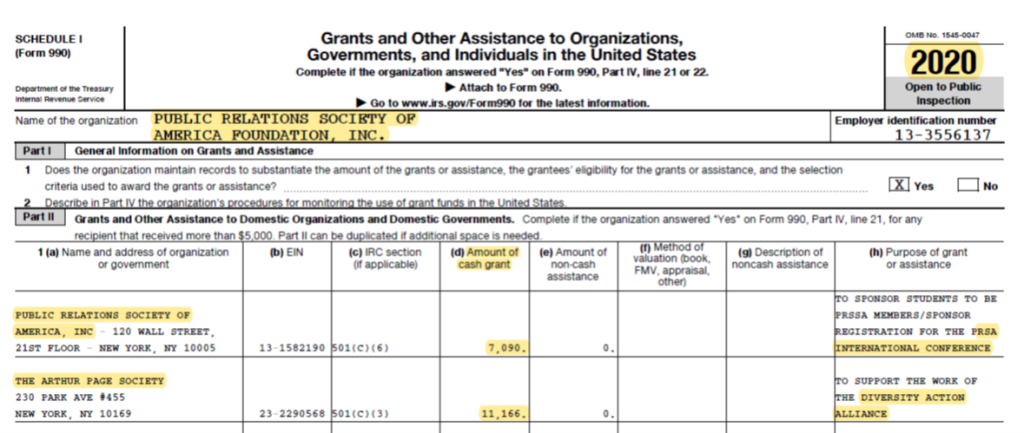Are the PRSA Foundation’s Race-Based Scholarships Unconstitutional?
The Public Relations Society of America (PRSA) Foundation states as its sole mission “promoting Diversity among public relations professionals and companies so that they can best serve the public good and address the needs of a diverse world.”
In terms of actual deliverables tied to this mission, the PRSA Foundation relies heavily on race-focused scholarship awards as evidence of its pro-diversity performance.
It’s therefore unclear why the PRSA Foundation — and its parent organization, PRSA, Inc. — have remained silent on this existential matter:
The June 2023 Supreme Court of the United States (SCOTUS) decision in Students for Fair Admissions v. Harvard found that race-based preferences in college admissions violate the Equal Protection Clause of the U.S. Constitution’s Fourteenth Amendment.
The decision immediately created a slippery-slope, by posing the follow-on issue of, if race-based college admissions are now illegal, then are race-based scholarships illegal as well?

Since its Board hasn’t offered comment, guidance, or advocacy publicly as of this date, the PRSA Foundation may soon have to ask the same question posed by reporter Noah Feldman for Bloomberg in addressing the SCOTUS decision:
“If your whole job description has been to press for Diversity, especially racial Diversity, what are you supposed to do when pursuing that objective has been rendered effectively illegal?”
Here’s more prior background as it relates to PRSA and the PRSA Foundation:
About 10 years ago, PRSA and its Foundation Board arbitrarily declared, without querying PRSA’s own Leadership Assembly voting delegation for the membership’s opinions or guidance, that Diversity – or lack thereof – was now the single most critical, systemic challenge facing the entire PR industry.
Interestingly, lack of ethical compliance in the PR industry or the need to fund research or advocacy around PR ethics didn’t even register on the PRSA Foundation’s radar screen as a competing issue worthy of Foundation consideration.
This oversight is made even more interesting by the fact that discriminating against people on the basis of race, sexual orientation, religious affiliation or any similar reason is, by definition, unethical… yet dealing with the Diversity topic through the lens of ethical practice has seldom registered as a talking point with PRSA.
For all the years since this “mission” shift, PRSA’s Board has plunked down a vast chunk of PRSA member dollars annually into propping up its separate money-losing Foundation, to the tune of at least $25,000 annually… even though PRSA, Inc., itself has been losing six- and seven-figures in member dollars for years now — which is not sustainable.


Once the die was cast to make the PRSA Foundation a Diversity-only charitable enterprise, its leadership forgot or otherwise neglected to set any benchmarks or measurable, timeline-driven objectives whatsoever for their mission-driven work — which in any PR or general business context are considered fundamental for success.
Not one.
Single.
Measurable.
Objective.
After all, why set any bar that would drive actual accountability for such a grandiose shift in purpose? Accountability is not exactly PRSA’s forte, in my experience dealing with them.
In effect, PRSA subcontracted out its own “Diversity” mission to the PRSA Foundation, which, in turn, re-subcontracted it out about six years later to yet another new-fangled organization… the “Diversity Action Alliance,” which also took it upon itself to set no public-facing measurable objectives.
The DAA states on its website, “We want an industry that reflects our society in 2025,” which, on the surface, seems fair enough, but no specifics are provided as to that hope, given that 2025 is — as of this writing — less than 14 months away.
The DAA’s sole mandate appears to revolve around pushing PR firms into being signatories to online promises to do better about their systemic racism. If they sign their name, they earn the privilege of being required to pay a “financial investment,” so that the DAA can continue operating without public-facing, measurable objectives, and without posting its financials.
My colleague Mike Paul — a stalwart advocate of PR industry Diversity, Equity and Inclusion and arguably a highly effective disrupter of status-quo thinking on the subject — ultimately resigned in 2020 as a strategic advisor to the DAA when he realized that it was just one more PR Diversity-Talk initiative lacking in the degree of seriousness he felt was required to meet the challenges at hand…
Here are several quick excerpts of the online chat that Mike and I had at the time:
As for itself, the PRSA Foundation – at a glacial pace – has pursued a Diversity-only scholarship fund-raising track, ever since its pivot to this mission.
The Foundation also had legacy scholarships and awards programs predating this Diversity-only mission, like the Betsy Plank Scholarship and Chester Burger Scholarship, not designated as Diversity-only but open to all students regardless of the color of their skin.
And I purposely say “color of their skin,” because I’ve seen no PRSSA Foundation scholarships set forth under the “Diversity” banners of – as but a few examples – being specifically reserved for those of the LGBTQIA+ communities or those of various faith-based affiliations, who undoubtedly also have been persecuted in society.
So, when the PRSA Foundation talks of supporting “Diversity,” they’re really just talking about a narrow focus when it comes to actually putting money where their mouth is.
If you go to the PRSA Foundation website today, you’ll find two categories of “Scholarships & Grants” listed:
- “For PRSSA Students”
- “For All Students”
Oddly enough, of the 17 funds designated as “For All Students,” nine of these funds are not in any way for “All” students but instead only for “BIPOC” or (the Foundation’s word) “minority” students (even though the term “minority” is offensive to some due to a “lesser-than” connotation).
“All” others need not apply… hence, the misnomer in PRSA’s category header.
In some cases – like the AGEAN Public Relations Fellowship, the Geoffrey M. Curtis Scholarship, LaunchSquad Fellowship, Method Communications Fellowship, and relatively new Mission North Fellowship – the student must be “BIPOC-identified” as a first hurdle to even qualify for consideration, but no PRSA Foundation guidance is provided as to precisely how that “identification” is determined or verified.
I presume everyone is on the honor system.

The Mission North recipient must also be “BIPOC female identified,” which certainly raises the question of various gender “identity” criteria – apart from the indisputable fact that with the PR industry awash in females at more than half or even three-fourths the industry’s workforce, shouldn’t the PRSA Foundation be recruiting more entry-level men for gender parity, if the Foundation’s focus is indeed on helping those who are in the “minority” in the industry?
After all, if the PRSA Foundation’s (and the DAA’s) whole purpose is to make sure the PR industry “reflects society,” it’s not a good look that the industry is outnumbered by women by some three-fourths but “society” in the U.S. is outnumbered by women by only a point-4 percentage point (.4).
Good luck on fixing that statistic before 2025.
Anyhoo… PRSA folks can certainly opt to agree or disagree on whether this year’s SCOTUS decision was a good or bad thing, but there now is this not-so-inconsequential matter of the PRSA Foundation following the law.
According to CNBC, “Nine states already ban race-based affirmative action policies for public colleges: Arizona, California, Florida, Idaho, Michigan, Nebraska, New Hampshire, Oklahoma and Washington”… not exactly a bevy of reliably all-red states.
“Scholarships and Recruitment in the Crosshairs” was included in a sub-headline this past summer for an Inside Higher Ed article about the SCOTUS decision… and here’s the rub:
It documented multiple schools immediately applying the same race-neutral admissions standard also to scholarships.
This matter raises serious questions for a “BIPOC” and “minority”-only scholarship warehouse like the PRSA Foundation … and whether it’s peddling a set of products that any “BIPOC” “minority” can legally pursue in the long-term.
And here’s the technical reason why:
The PRSA Foundation claimed in its 2020 IRS 990 that it cuts its current scholarship checks to an awarded student’s verified college or university’s bursar’s office for direct application against tuition fees, which certainly is proper practice if in fact it’s consistently happening:

But now, if that PRSA scholarship was determined and awarded on required grounds of race that are now deemed illegal in a school’s state, then what’s the compliance mandate for the college / university bursar’s office to refuse receipt of PRSA’s funding?
Does this mean that in those nine states that already ban race-based preferences, that PR students in those states cannot receive race-determinant PRSA Foundation scholarships because they’re not legally recognized or compliant with state law?
PRSA and the PRSA Foundation might want to noodle on this issue and get out from behind it, since it’s now way too late to get ahead of it.
It’s been months since the SCOTUS rulings came down, yet neither PRSA organization (the member business league nor the charitable Foundation) has said “peep” about it.
For all of PRSA’s Diversity posturing for years now, you’d have thought that PRSA and/or the PRSA Foundation could have mustered enough collective thought to issue a position paper or “Friend of the Court” amicus brief or something to advocate for their race-based scholarship rationales, before the SCOTUS ruling came down.
But no… Instead of meaningful advocacy in defense of their very mission, these folks are asleep at the wheel.
One must ask, why didn’t they speak out to defend race-based preferences, since it’s literally the PRSA Foundation’s raison d’être?
I’m going to take a wild guess that it’s because PRSA executive staff (who oversee both PRSA and its Foundation and have hired the same auditor for both organizations for well-more than a decade… which is NOT a best-practice) really don’t want to attract any form of government scrutiny to their own operations, Board minutes, or financial records.
After all, both organizations are about as financially transparent as pea soup.
Example:
As of today (Nov. 12, 2023), the online placeholder where the PRSA Foundation apparently makes its IRS 990 disclosure available on its website has only its 2018 tax filing posted… from five years ago. Also as of this writing, the most recent IRS 990 even filed for either PRSA or the PRSA Foundation is from 2021… nearly two years ago.
The Foundation hasn’t published a narrative annual report, either, since the pandemic first hit.
Past PRSA Foundation IRS 990 annual filings have laid bare that it has forked “charitable” dollars back to PRSA, Inc., to help prop up the business league’s P&L via its International Conference registration revenues.
It has also siphoned Foundation money to the so-called “Diversity Action Alliance,” whose executive director concurrently served in 2020 as executive director of the PRSA Foundation… in the category of “no-conflict-of-interest-can-go-unexploited.”

In that same year (2020), the PRSA Foundation only managed to give 22 students (whether in the “Diversity” category or not) a paltry $38,900 in total, which comes to $1,768 on average per student… only enough to cover two or three credit-hours of collegiate instruction at many institutions.
This level of impact does not exactly scream “Systemic Change!”

For years, the PRSA Foundation has fallen short when it comes to donor relations and inspiring confidence that anyone is minding the fiduciary store. Legitimate questions are met with stonewalling and, ultimately, hostility.
Add on to the concerns the recent “Diversity” foul-ups by PRSA and PRSA’s New York Chapter in mishandling comms impacting the Jewish community, and one can logically question a variety of biases underpinning PRSA’s “Diversity” platform.
As a wrap-up to the whole argument about the strategy the PRSA Foundation embraced years ago, noted scholar Richard D. Kahlenberg wrote recently in The Atlantic:
“The current framework of race-based preferences…is broadly unpopular, has been highly vulnerable to legal challenges under federal civil-rights laws, disproportionately helps upper-middle-class students of color, and pits working-class people of different races against one another. Major public and private universities cling to the status quo anyway, because doing so is easier financially than helping demonstrably disadvantaged students.”
Stay tuned. And in the meantime…
For academic institutions and foundations seeking to weigh their own decisions going forward, the Association of Governing Boards of Universities and Colleges published online a list of questions and considerations that should be addressed on this matter… check it out.
